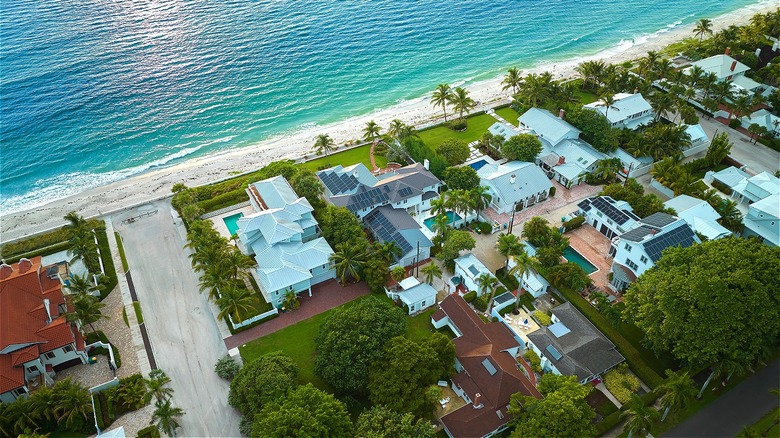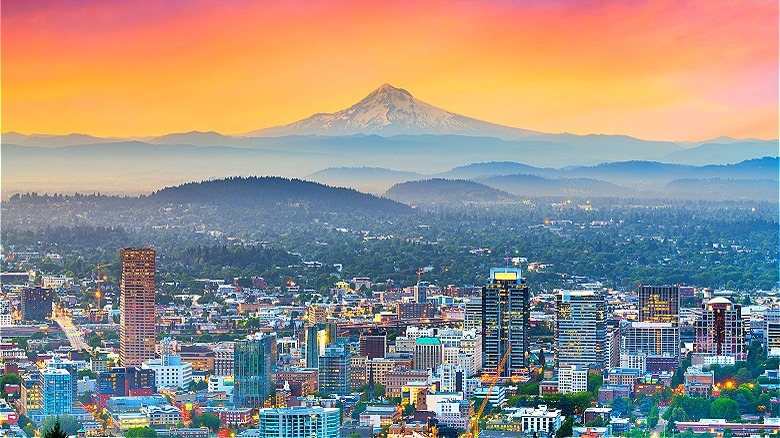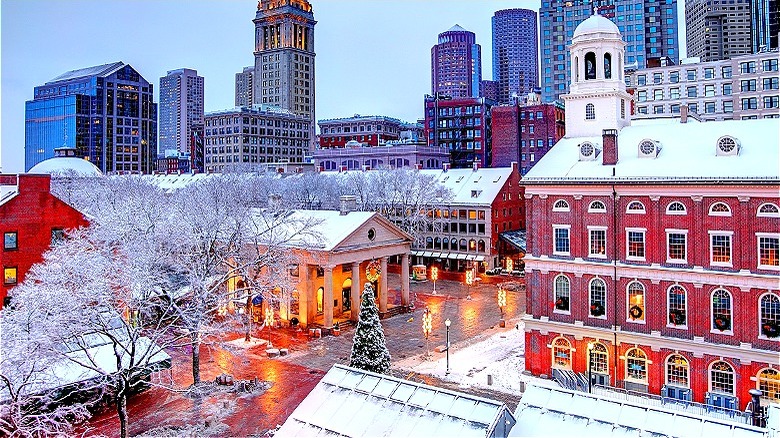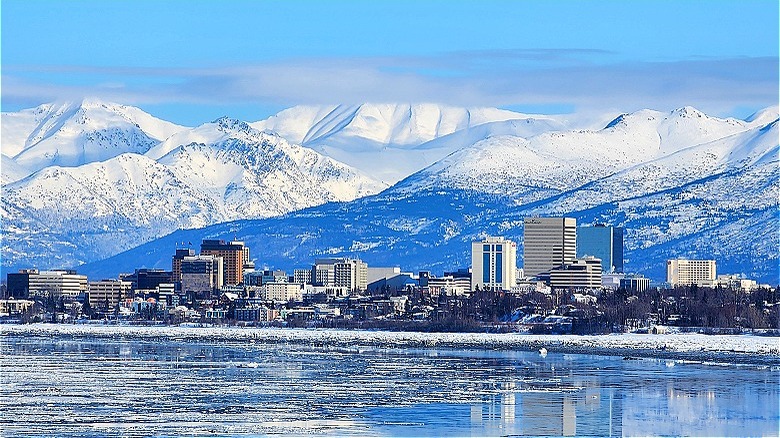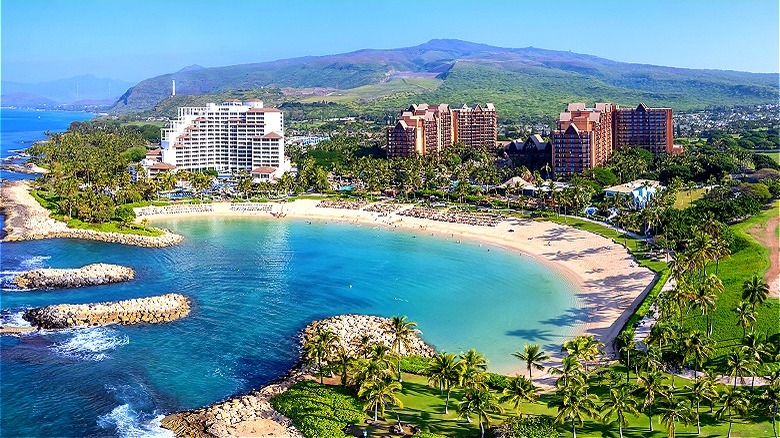The 5 Most Expensive States To Live In
Living in an expensive state in America is something of a balancing act. On one hand, these pricey states typically command their premium cost of living for a reason. Perhaps that reason is the state's great weather or scenic surroundings that make life seem like a year-round vacation. Or perhaps it's a state's reputation for attracting top workforce talent and offering workers a plethora of high-paying jobs. After all, a high cost of living requires a healthy income.
That all said, expect even high incomes to be stretched, thanks to stratospheric home prices and elevated energy costs. That's not to mention states that have high tax burdens, such as property tax, income tax, and sales tax. Combined, all of these characteristics define an expensive state, though, occasionally, the cost of shipping goods like food to a remote location can also contribute to the pricey-state equation. Considering the whole of these factors, let's take a look at five of the most expensive states in our union and why they may or not be the right fit for you.
5. Oregon
A recurring pattern observed while compiling this list of the most expensive states to live in is the appearance of coastal cities. Oregon's rugged coastline definitely delivers in that regard, but it also has Mt. Hood, lush evergreen forests, and even a burgeoning winemaking scene. Indeed, this appeal has done a good job attracting new residents relocating from elsewhere. Perhaps too good, because housing supply hasn't been able to keep up with demand, resulting in lofty home prices. As well, property taxes are among the highest in the nation, putting further squeeze on dwelling prices.
Overall, residents of the Beaver State face a cost of living that's 21.1% higher than average in the United States. If it's any consolation, wages are also strong, with a growing tech industry that mirrors its neighbor to the south, California. As well, Oregon is one of just five states that doesn't charge sales tax, though policies on certain goods like alcohol and tobacco vary by municipality.
4. Massachusetts
Besides ready access to the ocean, another common thread among U.S. states that have the highest cost of living is elevated home prices, and the Bay State is no exception. According to the National Association of Realtors, the average home price in Massachusetts was approximately $523,000 in early-2023, which represents about a 40% premium over the national average of $375,000. Besides pricey real estate, the third-highest rates for electricity in the United States catapult Massachusetts residents to a cost of living that's 41% higher than the national average.
However, the Bay State is filled to the brim with well-educated professionals and hosts esteemed places of higher learning, such as Harvard and the Massachusetts Institute of Technology. To wit, the state's mean income is the third-highest in the nation at $115,964 per household. Besides frequent appearances on lists of expensive places to live, Massachusetts appears just as frequently on lists of the wealthiest states.
3. Alaska
Like Hawaii, which is also on this list of expensive states to live in, Alaska's remote location makes for a high cost of living. Sure, you can drive there but it's a circuitous route requiring you cut through Canada from the continental United States. And once goods arrive over the Alaskan border, there is the logistics of distributing them across the largest state in the union by landmass. In fact, Alaska is more than twice the size of runner-up Texas.
While home prices in Alaska are fairly modest, we've already established that everyday goods like groceries are pricey, but so is health care. In particular, lack of access to regular preventative health care for Alaskan residents results in more dire, and expensive, emergency situations that may have been preventable.
Overall, the cost of living in Alaska is 24.4% more expensive than the average cost in the entire country. Still, if you can tolerate colder climates, Alaska is a beautiful place to live in, with glaciers, mountains, seemingly endless coastlines, and abundant wildlife.
2. California
Depending on your criteria, California ranks slightly higher or lower on the list of most expensive states to live in, but it consistently squeezes into the top five. Its cost of living, on average, is 38% higher than the national benchmark. While California isn't the largest contiguous U.S. state in terms of landmass — that honor goes to Texas — it does have the largest population. California also offers residents a scenic coastline, mountains, and starkly beautiful desert landscapes, all combined with consistently great weather that, for the most part, isn't too hot or cold.
Jobs-wise, whether it's the atmosphere or a desire to be surrounded by and work with like-minded individuals, California has long attracted talented forward-thinkers. To wit, many top tech companies were founded there, including Nvidia, Google, Tesla, and Apple (check out our five suggestions to save money on Apple products). Appropriately, the median household income across the state is $91,551, which is the sixth-highest in the nation.
However, residents will need every cent of that income to purchase a home in the Golden State. According to real estate firm Zillow, the average home price in California in February 2024 stands at $765,197. That's compared to a nationwide home value of $347,716. Energy, like electricity and gasoline, are also expensive in California because of taxes that fund the state's aggressive green-energy policies.
1. Hawaii
It's not really surprising to learn that Hawaii is the most expensive state to live in. After all, it's a series of remote islands smack dab in the middle of the Pacific Ocean. Homes are expensive due to a limited amount of available land, while consumer goods — including food — have to be shipped from long distances via ship or airplane. Also, electricity is notoriously expensive in Hawaii, making it one of the few places in the United States where car owners won't save money over the long run driving an electric vehicle versus a gasoline-powered vehicle.
What's especially challenging about living in Hawaii, though, is that unlike some other expensive states, there may not be as many lucrative employment opportunities in the private sector, with many job openings catering to the tourist trade, such as retail and food service. Therefore, living in Hawaii is perhaps better suited to retirees or folks that have already accumulated wealth elsewhere. Though clearly, Hawaii isn't among the cheapest states to retire to. Living in Hawaii's capital, Honolulu, is 84% more expensive than the nationwide average, according to PayScale.
